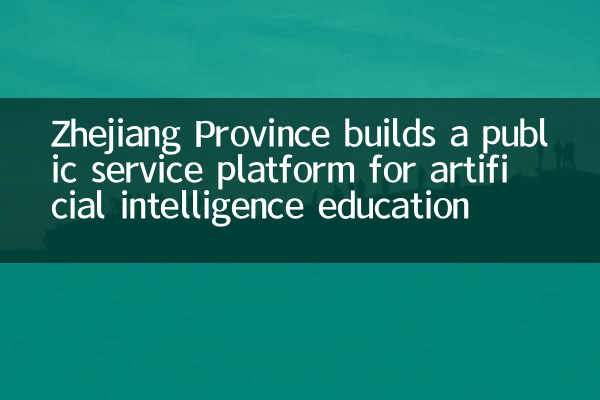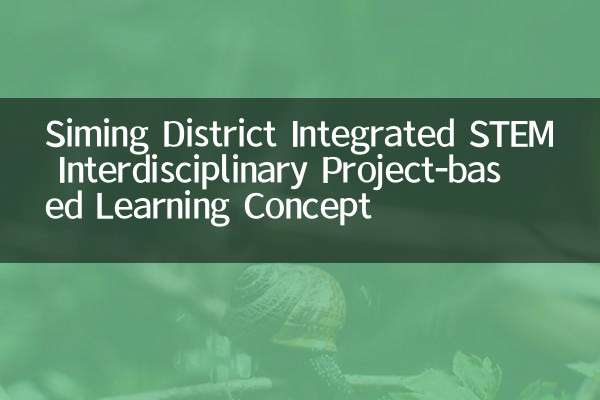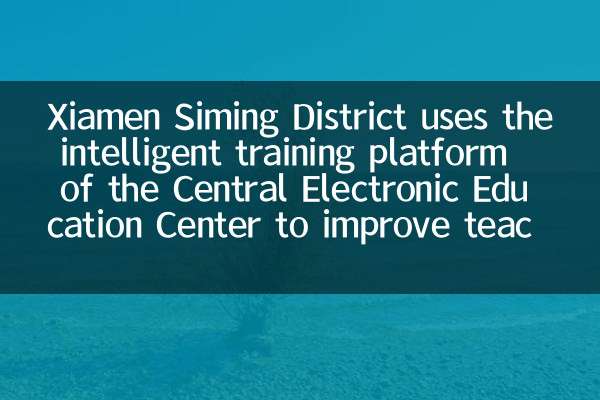Zhejiang Province builds a public service platform for artificial intelligence education: empowering a new ecology of future education
In recent years, artificial intelligence technology has developed rapidly and has gradually penetrated into all walks of life. As an important cornerstone of social development, the field of education has naturally become a hot topic for the application of AI technology. As a strong province in China's economy and education, Zhejiang Province recently announced that it will build an artificial intelligence education public service platform, aiming to promote the digital transformation of education and improve educational equity and quality. The following will conduct detailed analysis from the aspects of background, platform functions, expected impact, etc.
1. Project background and significance

The Zhejiang Provincial Department of Education, together with a number of technology companies, plans to build an artificial intelligence education public service platform covering the entire province by 2024. The platform will integrate AI technology resources to provide intelligent educational services to schools, teachers, students and parents. This measure responds to the call of the national "Education Digitalization Strategic Action" and is also an important step in Zhejiang Province to build a "digital education demonstration zone".
2. Platform core functions and data support
The platform will provide the following services around the four core scenarios of "teaching, management, evaluation, and resources":
| Functional module | Specific content | Overwrite object |
|---|---|---|
| Intelligent lesson preparation system | AI generation lesson plans, exercise recommendations, and courseware optimization | teacher |
| Personalized learning | Learning situation analysis, adaptive learning path planning | student |
| Educational Resource Library | Share high-quality course resources in the province | School |
| Educational Management | Big data monitoring, decision-making support | Education Department |
According to the plan, the platform will be promoted in three stages:
| stage | Time node | Target |
|---|---|---|
| Phase 1 | June 2024 | Completed the construction of the basic platform, covering 500 schools |
| Phase II | December 2024 | Achieve full coverage of K12 schools in the province |
| Phase 3 | 2025 | Expand to the fields of vocational education and lifelong education |
3. Technology highlights and innovation
The platform will adopt a number of cutting-edge AI technologies:
1.Multimodal learning analysis: Through voice recognition, expression recognition and other technologies, monitor students' learning status in real time.
2.Knowledge graph construction: Establish a discipline knowledge network to achieve accurate recommendations of knowledge points.
3.Virtual Teacher Assistant: Answer students' questions and answer questions in 7×24 hours.
4. Expected Benefit Analysis
According to the pilot data forecast, the platform will bring significant benefits after it is put into use:
| index | Expected improvement |
|---|---|
| Teachers’ lesson preparation efficiency | More than 40% |
| Students' interest in learning | More than 35% |
| Educational resource sharing rate | Increased from 30% to 80% |
| Teaching quality in rural schools | Close the 20% gap with urban schools |
5. Challenges and responses
Despite the broad prospects, platform construction still faces many challenges:
1.Data security: Student privacy protection is the key, and the platform will use blockchain technology to ensure data security.
2.Digital Divide: For underdeveloped areas, hardware support and teacher training will be provided.
3.Technical Ethics: Establish an AI education application ethics committee to standardize the boundaries of technology use.
6. Expert opinion
Professor Li from the School of Education of Zhejiang University said: "This platform will reconstruct the education ecology, but attention should be paid to avoiding technological alienation and maintaining the humanistic temperature of education." Mr. Wang, head of Alibaba Cloud's education industry, believes: "This is a model case of government-enterprise cooperation in promoting the digitalization of education."
Conclusion
The construction of Zhejiang Province’s artificial intelligence education public service platform marks the entry of a new stage of educational informatization. Through the deep integration of AI technology and education, it is expected to realize the thousand-year educational ideal of teaching students in accordance with their aptitude and provide a "Zhejiang solution" for the digital transformation of education across the country. In the future, how to balance technological innovation and the essence of education still needs to be continuously explored in practice.

check the details

check the details